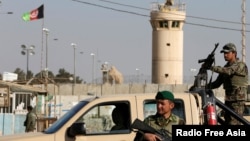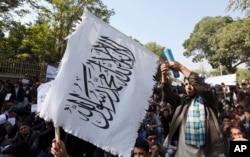A suicide bomber blew himself up just outside the U.S.-controlled Bagram military airbase in Afghanistan, causing "a small number of casualties," Afghan and U.S. officials said.
The attack occurred Wednesday evening at an entrance to the airbase, located in Parwan province about 60 kilometers north of Kabul, and was being investigated, said a U.S. military statement.
"The casualties are being treated at Bagram medical facilities," the statement added, without further details.
The Taliban swiftly took credit for the violence, saying a suicide bomber riding a motorbike carried out the attack to take "revenge" on "American invaders" for insulting Islam.
The insurgent group claimed the bombing "killed and wounded up to 20" American forces, although the Taliban has, in the past, given inflated tolls for such attacks.
Prior to the suicide bombing, a senior U.S. military commander apologized for leaflets, recently dropped in and around the Bagram area, that were deemed offensive to Islam.
As part of an official campaign to urge Afghans to report insurgents to authorities, the leaflets included an image of a lion chasing a white dog, the same color as the Taliban flag. Islamic verses are superimposed on the image of the dog, which is considered an unclean animal in Islam.
The leaflets outraged Afghans and prompted calls for bringing those responsible to justice.
"The design of the leaflets mistakenly contained an image highly offensive to both Muslims and the religion of Islam," said Major General James Linder.
"I sincerely apologize. … There is no excuse for this mistake," a statement quoted the general as saying. He vowed to investigate the incident and hold to account those responsible.
The Taliban said in a statement the leaflets showed what the insurgent group described as American "hatred" of Islam.
U.S. commanders were forced to apologize in 2012 after copies of the Muslim holy book, the Quran, and other religious texts were mistakenly burned at Bagram Airbase.
Critics took to social media to express their surprise over the latest incident.
"My goodness. One would think that after so many years, such things would no longer happen," said Washington-based analyst Michael Kugelman in a Twitter post.
Borhan Osman, a researcher at the Kabul-based Afghanistan Analysts Network, noted that rage is building against the NATO-led Resolute Support, or RS, mission in the country in reaction to the controversial leaflets.
"The kalima [statement of Islamic faith] is on the Taliban flag. But even the dumbest of RS cultural advisors shouldn't have missed the sensitivity," Osman wrote in a Twitter post.

